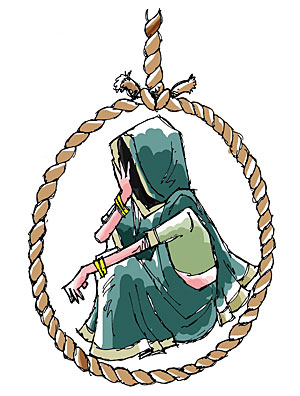 BILASH RAI |
It seemed like an ordinary evening. It was a week after Dasain, and Arati Sharma was at her parents' home in Dhobichaur, Kathmandu. Her mother had made dinner for the family earlier in the evening. Arati was getting ready for bed when suddenly her mother started foaming at the mouth. Realising she had consumed a poison of some kind, Arati rushed her mother to Bir Hospital and admitted her to the emergency room.
Bimala Gautam died 12 days later of organophosphate poisoning, commonly known as poisoning by pesticide. She was 38 years old.
Suicide is the leading cause of death among women of reproductive age, a report published by the Family Health Division has found. Almost 16 per cent of deaths among women between the ages of 15 to 49 are suicides. This figure has shot up dramatically since 1998, when only 10 per cent of the deaths were attributed to suicide.
The suicide tally has gone up across the board. Police figures from 2008 showed that there had been a 40 per cent increase in suicide in the preceding four years. In fact, death by suicide was higher than the death toll inflicted by the conflict in some years.
But the number of suicides among women is higher than that among men. Kathmandu Metropolitan Police registers 10-15 suicide cases each week, the majority of which are women.
Why are women killing themselves at this alarming rate?
Bimala Gautam was the sole earner in her family; her husband was inebriated most of the time. Living in a rented apartment in Kathmandu, she took odd jobs to support her husband and young daughters. In a report filed with the police, her daughter wrote, "We don't really know why she took her life. But since no sons were born in the family, the pressure might have told on her."
There have been no specific studies on the causes of suicide in Nepal. What is known, however, is that women face unique social and psychological conditions that force them to take desperate measures.
In 2008, United Nations Population Fund (UNFPA) and Saathi, a women's NGO based in Kathmandu, analysed gender-based violence in Surkhet and Dang districts. Over 80 per cent of respondents reported experiencing domestic violence from their husbands and other family members, and 74 per cent were forced to participate in non-consensual sex, also known as marital rape.
"What was disturbing is that during focus group and individual interviews, the majority of those women said they had felt suicidal," says Bandana Rana, president of Saathi, who also led the research. "Only a few say they actually attempted suicide. But the majority of them said they wanted to die (malai marna mann lagyo)."
There is no specific data linking domestic violence with suicide. But experts say trauma, depression and other mental illnesses are among the common psychological after-effects of domestic violence.
"Mental violence at home is virtually impossible to prove. But it can be speculated that this could lead to feelings of helplessness and desperate measures," says Michiyo Yamada, Gender Program Officer at UNFPA Nepal.
Victims of domestic violence have little legal recourse. The government has not developed any comprehensive legal programs to prevent violence against women, nor has it met international obligations to protect women from violence or punish perpetrators. Prime Minister Madhav Kumar Nepal famously announced that he would open a hotline to his office to assist women in critical conditions. After months of complaints, the phone now rings at the other end of the line. Women are prompted to leave a message but no one responds to them.
The upward trend in suicide can be avoided, says Kiran Bhatia, gender advisor at UNFPA. "Every suicide is a cry for help; an unmet need for urgent intervention for a woman who is trapped in a situation where she has reached
the limit of her capacity to cope with violence, abuse and discrimination. These women desperately need support."
(Names of the victim and her family members have been changed)


